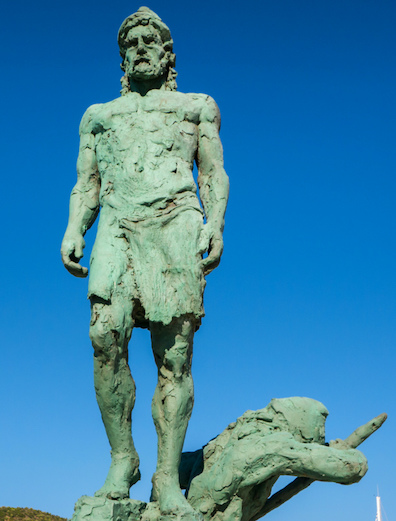In four short sentences of Ithaca, Joyce alludes to
both of the major literary analogues in his novel, Hamlet
and the Odyssey: "To enter or not to enter. To knock
or not to knock. / Bloom's decision? / A stratagem." The
allusions are unusually overt and they feel like comical
throwaway lines––light mockeries of tragic or epic gravity.
But Joyce no doubt has some jocoserious purpose in
deploying them at the front door of 7 Eccles Street.
Hamlet's "To be or not to be" soliloquy comes early in act 3,
just before he rejects Ophelia and springs The Mousetrap
on Claudius. As he weighs embarking on a course of action that
may prove fatal, he anticipates the dreadful realities that
may await him after death and finds that "the native hue of
resolution / Is sicklied o'er with the pale cast of thought."
Bloom faces no corresponding threats and no comparable weight
of decision-making. He merely asks himself whether "To
knock or not to knock," rousing Molly from her bed to
come down and unlock the front door.
But it is not unlikely that he is experiencing some
Hamlet-like inner turmoil. Anyone might hesitate before waking
a spouse late at night, and Bloom has returned much later than
usual, with a companion in tow. (He once came back with a
stray dog and Molly was not amused.) More to the point, after
a long day of anguish about the sexual acts being committed in
his house, he can hardly be looking forward to encountering
his wife at the door. The adultery may be a matter of unspoken
mutual understanding, but Bloom is anything but unconcerned.
Later in Ithaca he thinks of leaving home and not
returning. Given his feeling that he may be standing on the
brink of an irreparable rift in his marriage, he may well
experience some hesitation about whether "To enter or not
to enter."
His "stratagem" of dropping down to the kitchen door
rather than knocking at street level echoes Odysseus's ploy of
entering his home disguised as a ragged old beggar––through
the servants' entrance, as it were. What awaits the epic hero
inside his palace is even more daunting than the dangers
facing Hamlet––more than 100 young blades strongly inclined to
violence against the rightful occupant. No violence awaits
Bloom inside his house, but later in the chapter the narrative
lists more than two dozen men
whom Bloom suspects of having posed sexual threats to his
marriage (a number sufficiently large to evoke the Homeric
suitors), and it asks how Bloom may respond to the most recent
violation of his marriage, acknowledging and rejecting the
uncivilized option of slaughter. Joyce clearly wanted to evoke
the bloodbath at the end of the Odyssey, so Bloom's
"stratagem" of climbing over the area railings functions as
something more than a mere joke.
These details fit the ambiguous pattern of mock-heroic parody
practiced throughout Ulysses. Comparing Bloom to
Hamlet and Odysseus does invite mocking laughter, but it also
invites sober consideration of how the uncommon common man may
embody timeless heroic archetypes.

